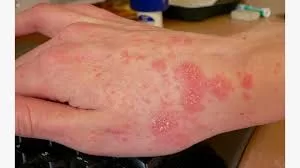August 12, 2024
A recent outbreak of scabies in New South Wales (NSW) has sparked concern among residents, particularly after multiple cases were reported in hospitals. This highly contagious skin condition has led to a surge in Google searches for “NSW scabies outbreak,” reflecting growing public awareness and apprehension.
The Outbreak
The Illawarra Shoalhaven Local Health District, located south of Sydney, reported the initial case of scabies at Wollongong Hospital in late July 2024. Since then, the outbreak has spread to three other hospitals in the region, with at least 11 patients and 23 staff members diagnosed with the condition.
Understanding Scabies
Scabies is caused by the Sarcoptes scabiei mite, a microscopic insect that burrows into the skin to lay eggs. The condition manifests as an intensely itchy rash, often accompanied by raised bumps or discolored lines that resemble “tracks” on the skin. Commonly affected areas include skin folds, such as between the fingers, under the armpits, and in the groin.
The itching associated with scabies tends to worsen at night or after a hot shower, making it particularly distressing. However, scabies can easily be mistaken for other skin conditions like eczema or psoriasis, so it’s crucial to seek medical evaluation if you suspect an infestation.
Transmission and Treatment
Scabies spreads primarily through skin-to-skin contact, though it can also be transmitted via contaminated towels, bedding, and clothing, as the mites can survive outside the human body for up to 48 hours. Following exposure, it may take two to eight weeks for symptoms to appear, which complicates efforts to control the spread of the condition.
The good news is that scabies can be effectively treated with topical creams or lotions, usually available over the counter. Treatment involves applying the medication to the entire body, except for sensitive areas like the head and neck. A follow-up application is typically recommended after a week to ensure the mites and their eggs are fully eradicated. Individuals treated for scabies can safely interact with others 24 hours after starting treatment.
Given the contagious nature of scabies, close contacts of infected individuals are often advised to undergo treatment as a precaution. Additionally, any bedding, towels, or clothing used in the previous 48 hours should be washed in a hot cycle or sealed in a plastic bag for a week to kill any remaining mites.
The Scale of Scabies
Scabies is more common than many realize. According to the World Health Organization, approximately 200 million people worldwide are affected by scabies at any given time. The condition is particularly prevalent in areas with high population density and is endemic in some remote communities in Australia, especially among Aboriginal and Torres Strait Islander populations.
Outbreaks of scabies can occur anywhere, including in regional and metropolitan areas. Environments where people live in close quarters, such as nursing homes, childcare centers, and prisons, are especially vulnerable to scabies outbreaks.
The NSW Hospital Response
Details about the origin of the NSW outbreak remain unclear, but it is noteworthy that hospitals, despite their stringent infection control procedures, have been affected. Health-care facilities have protocols in place to manage scabies outbreaks, including isolating affected patients and requiring staff to take extra precautions.
Staff members diagnosed with scabies are advised not to return to work until 24 hours after receiving treatment. Meanwhile, the Illawarra Shoalhaven Local Health District is conducting extensive contact tracing to identify those at risk of exposure.
Despite these efforts, controlling the outbreak may take some time due to the challenges in diagnosing scabies and the delay in symptom onset following exposure. However, there is no need for panic. Individuals who have spent time in the affected hospitals or live in the surrounding areas should remain vigilant for any unusual rashes and seek medical advice if symptoms develop.
This outbreak underscores the importance of public awareness and timely medical intervention in managing contagious conditions like scabies. By staying informed and taking appropriate precautions, the community can help prevent the further spread of this skin infestation.











